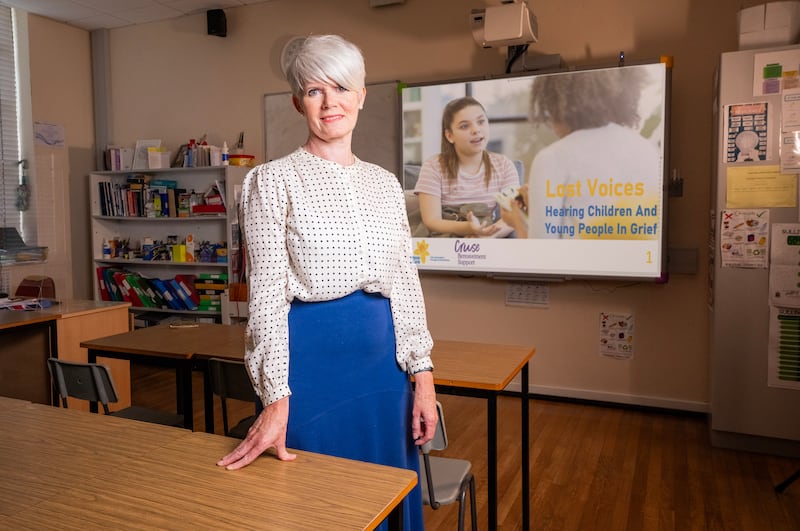More than 300 teachers across Northern Ireland will begin bereavement training to enable them to better support students who have lost a loved one.
The training, that will take part at seven venues across Northern Ireland on Monday, has been designed by Marie Curie and delivered in partnership with CRUSE bereavement support.
Sullivan Upper School in Holywood is training all of its 80-strong teaching staff, including technicians and classroom assistants.
Catherine Moore, the deputy principal and pastoral lead at Sullivan, said bereavement and grief had impacted their students.
“Over the course of the last academic year, sadly our school community was deeply affected by many bereavements.
“And we’re constantly reviewing at the school our practice and identify training needs, but really because so many of our children were affected by that, I felt that it was something really the whole staff would benefit from,” she said.
“Being able to equip them with the necessary skills to support the pupils, but also for the staff themselves, so that the children might go to a member of the teaching staff or non-teaching, classroom assistants.
“So I felt that if everybody was trained in this, then we were in a much better position to support our pupils than what we currently are.”
We are in Omagh and Newtownabbey today with @CruseSupport equipping teachers to help children and young people who are experiencing bereavement. First two of 10 sessions throughout NI this week training 250 teachers. pic.twitter.com/VmSLPqwVfv
— Marie Curie NI (@MarieCurieNI) August 21, 2023
Ms Moore said that there will be regular instances of bereavement in the school community.
“In a normal school year, we would have bereavement of grandparents, but last year, we were hit particularly with children losing a parent, and we also lost a valued colleague as well, which deeply affected the whole school community,” she said.
She added: “At times over my teaching career I’ve been hit with bereavement and when you come back to school, you are a wee bit wobbly, and you do need other people to understand what it’s like for you so if staff have that understanding and it will help support our pupils.”
Joan McEwan, associate director of policy and public affairs at Marie Curie, said the training was part of a wider programme aiming to integrate grief and bereavement awareness into the curriculum.
“The first phase of this is teacher training, and we did teacher training last year, around the same time last year, where we trained around 100 teachers and carried out evaluation on the before-and-after experience of those teachers, and the demand was so high this year that we are delivering it again,” she said.

Ms McEwan said in the aftermath of Covid, children dealing with grief during their time at school had only become more common.
“It’s estimated that around one child in every classroom has been bereaved of a parent or sibling,” she said.
“It’s likely that most children will be bereaved of someone close to them by the time they leave school. So, all schools will be affected by a bereavement at some point.
“And of course, this has been exacerbated by Covid with the increase in excess deaths and obviously the knock on impact of the number of people bereaved, and very often we forget that many of those people bereaved are children.
She added: “So it’s really important that we provide support to young people in a school environment because without it, many children can experience complex grief and mental health issues later in life if it’s not supported.”
The training begins with teachers learning about the extent of child bereavement, before learning how this can manifest in children’s behaviour at school.
Day 4 training 49 fantastic teachers from @sullivan_upper & a new high in more ways than just numbers. The room was absolutely buzzing – thanks to the energy, enthusiasm & dedication of the teachers. Lots of pics taken but this one says it all. #schoolsbereavement pic.twitter.com/ijCf2mE3Fl
— Joan McEwan (@merynisle) August 24, 2023
Ms McEwan said: “They can feel a wide variety of feelings and also physically act out in different ways, they can feel anger, confusion, have disturbed sleep, be withdrawn.
“This can manifest in disruptive behaviour in the school environment as well.”
Ms McEwan said the course was practical and designed to replicate scenarios teachers may encounter when helping a child experiencing bereavement.
“It includes information around age-appropriate language and terminology and importantly things like avoiding euphemisms and using plain language,” she said.
“It includes a section on difficult questions that young people can ask around death and what happens when you die.
“It also includes really practical, useful practical tools to use with children and also some roleplay and scenarios that are reflective of real-world situations that teachers face.”
A pilot training course was held by Marie Curie last August with around 90 teachers, and Ms McEwan said teachers giving feedback from the pilot stated increased confidence in tackling bereavement in the classroom.
“The training evaluation told us that teachers felt more confident, they told us that they were able to have these difficult conversations with pupils and young people, they felt they were more able to pick up the signals that a child was grieving, and they were better equipped to have those supportive conversations with pupils and parents,” she said.
“Importantly, some of them told us that they would have previously avoided the topic or asked another member of staff to come in and help them.”








